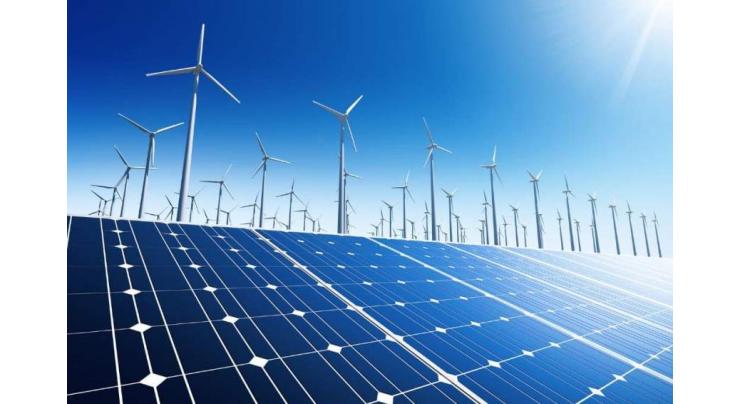
Australia Unveils Budget Aimed At Becoming 'renewable Superpower'
Muhammad Irfan Published May 14, 2024 | 06:18 PM

Australia touted plans to become a "renewable energy superpower" in an annual budget Tuesday, but the government's books also laid bare the depth of the economy's dependence on mining and fossil fuels
Canberra, (APP - UrduPoint / Pakistan Point News - 14th May, 2024) Australia touted plans to become a "renewable energy superpower" in an annual budget Tuesday, but the government's books also laid bare the depth of the economy's dependence on mining and fossil fuels.
Treasurer Jim Chalmers said the country was on track to bank a budget surplus of US$6 billion (Aus$9 billion) this year, a windfall propped-up in part by surging prices for iron ore and coal.
While heavily-polluting commodities were projected to fuel Australia's economy for years to come, Chalmers said the mining giant could no longer ignore the clamour for clean energy.
"We know the global energy transformation represents a golden opportunity for Australia," Chalmers said in his budget speech.
"If we hang back, the chance for a new generation of jobs and prosperity will pass us by. This budget invests in our renewable energy superpower ambitions."
At the centre of the budget was the fledgling "Made in Australia" program, which aims to catalyse homegrown clean energy and advanced manufacturing industries.
Modelled on the Inflation Reduction Act in the United States, it will pour US$15 billion into solar panel manufacturing, low-carbon fuels, tax breaks for critical minerals, and other priority areas.
Blessed with abundant sunshine, windswept coastlines, and teeming deposits of rare metals and minerals, Australia's potential as a renewables superpower has been talked up for years.
But these dreams have invariably come to nothing as policy makers grapple with the country's long reliance on iron ore, thermal coal, and natural gas -- which remain among its most lucrative exports.
Iron ore alone accounted for 18 percent of Australia's exports last year, according to budget papers.
"But those massive economic windfalls from mining and coal will soon start to drop off as economies decarbonise," energy analyst Tim Buckley told AFP.
"With this plan in the works, and if we make the right choices, that renewables dream could become a reality within the next decade."
Buckley said the push for local manufacturing could also limit Australia's exposure to external economic shocks.
"We can accept that China has cornered the market in an area like solar panels, and resolve to just buy from them forever," he said.
"Or we can build some domestic capacity as a kind of energy security policy."
Many climate activists already question whether Australia is capable of phasing out fossil fuels, or is simply paying lip service to the idea.
Just last week the Australian government made clear its intent to continue relying on natural gas -- a fossil fuel -- as a key source of energy over the next 30 years.
Australia will spend big as it embarks on its biggest military overhaul in a generation, a raft of investments largely designed to keep a rising China at bay.
First and foremost is a 30-year plan for Australia to manufacture its own nuclear-powered submarines, part of the tripartite AUKUS pact between Washington, London and Canberra.
Early trickles of AUKUS funding, outlined in the budget, will help Australia recruit and train the 20,000-strong workforce needed to build a nuclear industry from scratch.
Meanwhile, the army will be re-tooled with an arsenal of missiles and long-range strike weapons, while six Hunter class frigates and three Hobart class destroyers will bolster an ageing naval fleet.
Australia has also earmarked major upgrades to key military bases on its northern coast, the first line of defence if flashpoints in the Taiwan Strait or South China Sea one day spiral out of control.
This military muscle will be complemented by a renewed diplomatic push into the South Pacific, where China has long been eager to build its influence.
Australia will fund land reclamation projects in climate-threatened countries, sink undersea cables to connect isolated islands, and help finance a raft of other infrastructure projects.
While Chalmers hailed Australia's first back-to-back budget surplus in almost two decades, a deficit of US$19 billion (Aus$28.3 billion) looms in the government's accounts next year.
Budget documents did however paint a rosier-than-expected picture for inflation, which could return to the government's target range sooner than expected later this year.
Related Topics
Recent Stories

Americans oblivious to US historic World Cup win, while Pakistan mourns: NYT com ..

ECP resorts to provincial officers as judicial request stalls: Spokesperson

Meeting discuss preparations for monsoon season

Hameed Haroon awarded for contributions to art, design, media & cultural

Police arrests impostor posing as cop in Hazro

ICC T20 World Cup 2024: Australia lose two wickets for 70 runs against England

AJK PM advises authorities for early provision of due facilities to Muzaffarabad ..

Fresh heat wave to hit entire J&K State from Sunday, June 10: Weather experts pr ..

Lahore-Paris Rally logo launched at Alhamra

Secretary Health of Balochistan, Saleh Baloch visits MSD

Lansana Wonneh, Representative of UN Women Pakistan met with the Speaker GB Asse ..

Oinic lights up Times Square’ in support of Pakistan for T20 World Cup 2024
More Stories From World
-

Lansana Wonneh, Representative of UN Women Pakistan met with the Speaker GB Assembly Nazir Ahmed
17 minutes ago -

Deputy PM Dar meets with President Erdogan
1 hour ago -

UN calls on world to come together in protecting oceans
1 hour ago -

PM departs to Pakistan after concluding five-day historic visit to China
3 hours ago -

UN Woman representative calls on Chief Minister Gilgit Baltistan Haji Gul Bur Khan
3 hours ago -

Govt. to send 1,000 students to Yangling Base for latest agri-training: Prime Minister Muhammad Sheh ..
3 hours ago
-

Seamless Hajj operation enables Pakistani pilgrims to focus on spiritual journey
4 hours ago -

Italy votes in EU election with Meloni poised as powerbroker
5 hours ago -

Ukraine targets airfield in south Russia with drones
5 hours ago -
PM Shehbaz's visit gets extensive media coverage in Chinese media
6 hours ago -
Syria's forgotten health crisis needs healing: WHO regional chief
6 hours ago -
PM Shehbaz's visit to China to help in CPEC upgradation: Zafaruddin Mehmood
6 hours ago








